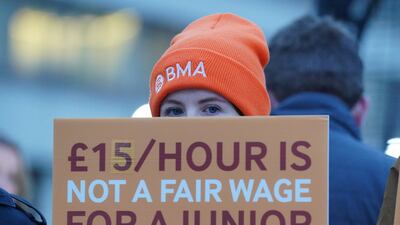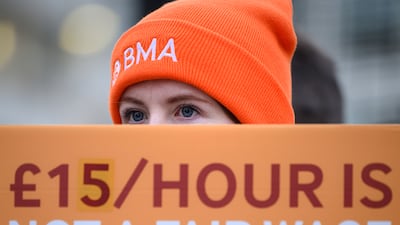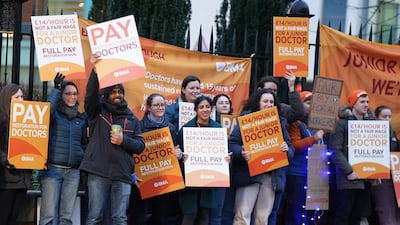England's junior doctors are gearing up for a five-day strike due to unresolved pay disputes with the government.
This strike, starting Saturday at 7am and ending on the evening of February 28, will see a significant number of medical practitioners stepping away from their duties.
The impending strike has sparked a response from Health and Social Care Secretary Victoria Atkins, who has publicly criticised the British Medical Association's decision-making process, claiming it “refused to put our offer to their members”.
Ms Atkins said the union was told the government had been “prepared to go further than the pay increase of up to 10.3 per cent that they have already received”, emphasising the need for continued dialogue to avoid the strike.
Counterarguments from the BMA's junior doctors' committee, led by Dr Robert Laurenson and Dr Vivek Trivedi, underscored their perspective.
They argue that the government's reluctance to offer a substantial pay increase has led to this deadlock.
“The government could have stopped these strikes by simply making a credible pay offer for junior doctors in England to begin reversing the pay cuts they have inflicted upon us for more than a decade”.
They pointed out that their willingness to postpone the strike for further negotiations was ignored, indicating the government's preference for confrontation over compromise.
“The same government could have even accepted our offer to delay this round of strike action to give more space for talks, all we asked for in return was a short extension of our mandate to strike,” they said.
“The fact that ministers have chosen strike action over what could have been the end of this year’s pay dispute is disappointing to say the least.”
This strike marks the continuation of a series of strikes by junior doctors, who previously staged the longest walkout in the National Health Service's history earlier in January.
The accumulation of strikes since March 2023 has resulted in significant operational disruptions, with more than 1.3 million medical appointments and procedures cancelled or postponed.
The government warned of the severe impact these strikes have on the NHS's functionality, with Ms Atkins expressing her desire to see medical professionals return to work rather than participate in picketing.
She reiterated the importance of maintaining treatment services during this period and urged the BMA to reconsider their stance for the sake of patient care.
Labour’s shadow health secretary, Wes Streeting, has voiced his concern over the detrimental effects of the continuing strikes on patient care, attributing the responsibility to Prime Minister Rishi Sunak's refusal to engage in meaningful negotiations.
Mr Streeting criticised the government's approach to handling the crisis, emphasising the avoidable nature of the service interruptions and their extensive cost to the NHS.
“The second year of strikes is having a devastating impact on patients,” he said, adding that the 1.3 million cancelled operations and appointments have cost the NHS billions.
“Never forget that Rishi Sunak could end these strikes, but is refusing to negotiate.
“He would rather blame doctors and nurses for the appalling state of the NHS than take any responsibility himself.”
The BMA remains open to further negotiations but has not discounted the possibility of additional strikes.
They have been advocating a “pay restoration” of 35 per cent to address what they describe as more than a decade of eroding salaries.
Junior doctors, who form a substantial portion of the NHS workforce and possess significant experience in various medical fields, are at the heart of this dispute.
Moreover, junior doctors affiliated with the Hospital Consultants and Specialists Association are also planning to join the strike later this month, potentially exacerbating the strain on the NHS's ability to deliver essential services.









